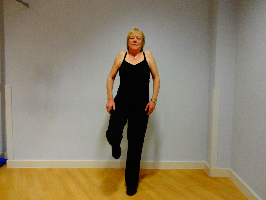
© Oxford University Hospitals NHS Trust 2013
Walking on spot, shoulder shrugs
Walking on spot, shoulder shrugs.
Walk on the spot for a count of 30, keeping as upright as possible. At a slow pace circle your shoulders upwards, backwards and downwards. Breathe in and out gently from your waist.
Repeat 3 times.
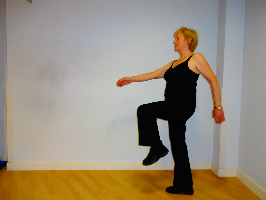
© Oxford University Hospitals NHS Trust 2013
Walking, raising arm and opposite leg
Walk on the spot for a count of 10. Walk tall with good posture.
Now walk forwards in a clear space for about 3 metres.
Walk swinging your arms and lifting your legs high.
Turn and walk back.
Repeat 3 times.
Walking forwards, side-ways, backwards
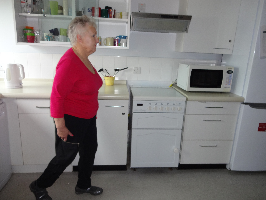
© Oxford University Hospitals NHS Trust 2013
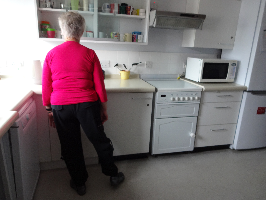
© Oxford University Hospitals NHS Trust 2013
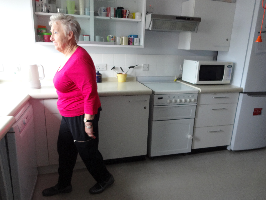
© Oxford University Hospitals NHS Trust 2013
a) Walk forwards in a clear space for about 3 metres. Walk tall with your arms relaxed by your sides. Turn and walk back to the start.
b) Walk sideways, leading with the left leg for about 3 metres. Pause. Walk sideways back to the start, leading with the right leg.
c) Walk forwards in a clear space for about 3 metres. Walk backwards to your start position. You may want to start stepping backwards with your hand resting on a bench top or against a wall or do a shorter distance.
Repeat 3 times.
.png)
© Oxford University Hospitals NHS Trust 2013
Walking figure of 8
a) Walk forwards in a clear space for about 3 metres. Walk tall with your arms relaxed by your sides. Turn and walk back to the start.
b) Now try walking in a figure of eight; start at the top of the 8 and go clockwise turn and walk round the bottom of the 8 anti-clockwise.
Repeat step (b) two times
.png)
© Oxford University Hospitals NHS Trust 2013
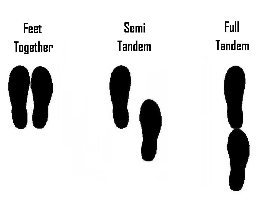
© Oxford University Hospitals NHS Trust 2013
Tandem standing with upper limb support
Stand on a level surface with eyes open and one hand resting on a sturdy chair or worktop for support.
a) Stand with feet together (10 sec)
b) Stand semi-tandem (10 sec
c) Stand full tandem (10 sec)
Repeat with other foot first. Repeat 3 times.
.png)
© Oxford University Hospitals NHS Trust 2013

© Oxford University Hospitals NHS Trust 2013
Tandem standing without upper limb support
Stand on a level surface with eyes open, worktop or sturdy chair nearby.
Progress: from 1 finger support, to standing with no hand support for each task.
a) Stand with feet together (10 sec)
b) Stand semi-tandem (10 sec)
c) Stand full tandem (10 sec)
Repeat with other foot first. Repeat 3 times.
.png)
© Oxford University Hospitals NHS Trust 2013

© Oxford University Hospitals NHS Trust 2013
Tandem standing with mental task
Stand on a level surface with eyes open, worktop or sturdy chair nearby but no hand support. Carry out a mental task (as per examples) in each position:
a) Stand with feet together (10 sec).
b) Stand semi-tandem (10 sec).
c) Stand full tandem (10 sec).
Repeat with other foot first. Repeat 3 times.
Mental task Examples:
1) Count Backwards from 20
2) Name as many names as you can
3) Subtract 7 from 100 and continue
4) Say the alphabet backwards
5) Say as many "A" words as possible
.png)
© Oxford University Hospitals NHS Trust 2013

© Oxford University Hospitals NHS Trust 2013
Tandem standing with eyes closed
Start: stand on level surface, worktop or sturdy chair nearby and finger-tip support.
a) Stand with feet together and close your eyes (10 sec).
b) Stand semi-tandem and close your eyes (10 sec).
c) Stand full tandem and close your eyes (10 sec).
Repeat with other foot first. Repeat 3 times
Progress to no hand support if able and safe
.png)
© Oxford University Hospitals NHS Trust 2013

© Oxford University Hospitals NHS Trust 2013
Tandem walk
a) Walk forwards in a clear space for about 3 metres. Walk tall with your arms relaxed by your sides. Turn and walk back to the start.
b) Now try to walk in line; place one foot directly in front on the other (heel to toe) for 10 steps in a row. You may want to do this exercise with your hand/ finger-tips resting on a worktop or against the wall. Progress to no hand support if able.
Repeat step (b) 3 times.
.png)
© Oxford University Hospitals NHS Trust 2013
One leg standing with upper limb support
Start: Stand on a level surface with eyes open and one hand resting on a sturdy chair or worktop for support.
Stand on one leg for up to 30 seconds.
Repeat with other leg.
Repeat 3 times.
.png)
© Oxford University Hospitals NHS Trust 2013
One leg standing without upper limb support
Stand on a level surface with eyes open, worktop or sturdy chair nearby
Progress from 1 finger support, to fingertip support, to no hand support.
Stand on one leg for up to 30 seconds
Repeat for other leg
Repeat 3 times
.png)
© Oxford University Hospitals NHS Trust 2013
One leg standing with mental task
Stand on a level surface with eyes open, worktop or sturdy chair nearby
Stand on one leg for 30 seconds. Add mental task (see examples).
Repeat for other leg.
Repeat 3 times.
Mental task Examples:
1) Count Backwards from 20
2) Name as many names as you can
3) Subtract 7 from 100 and continue
4) Say the alphabet backwards
5) Say as many "A" words as possible
.png)
© Oxford University Hospitals NHS Trust 2013
One leg standing with eyes closed
Stand on a level surface with eyes open, worktop or sturdy chair nearby and fingertip support.
Stand on one leg. Close your eyes. Stand for up to 30 seconds
Repeat for other leg
Repeat 3 times. Progress to no hand support if able.
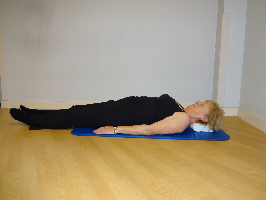
© Oxford University Hospitals NHS Trust 2013
Chin tuck in lying
Lie on your back with a pillow/folded towel to support your head.
Tuck your chin in until you feel a gentle stretch at the back of your neck.Look forwards and keep your head level throughout (don't tilt your head up or down).
Hold for 5 seconds. Relax. Repeat.
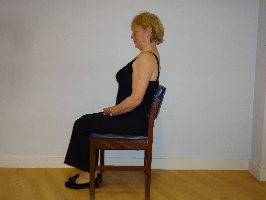
© Oxford University Hospitals NHS Trust 2013
Chin tuck in sitting
Sit as upright as possible on a chair with a backrest.
Tuck your chin in until you feel a gentle stretch at the back of your neck.Look forwards and keep your head level throughout (don't tilt your head up or down).
Hold for 5 seconds. Relax. Repeat.
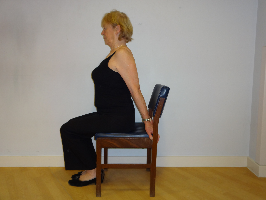
© Oxford University Hospitals NHS Trust 2013
Chin tuck with trunk extension in sitting
Sit towards the edge of a chair with your arms straight by your sides.
Gently turn your hand outwards and reach backwards to place your hands on the chair. Squeeze your shoulder blades together and then tuck your chin in until you feel a gentle stretch at the back of your neck.
Hold for 5 seconds. Relax. Repeat.
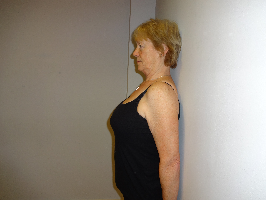
© Oxford University Hospitals NHS Trust 2013
Chin tuck with trunk extension in standing
Stand with your heels, hips and back against a wall.
Take your back towards the wall as far as possible, and then tuck your chin in until you feel a gentle stretch at the back of your neck.
Hold for 5 seconds. Relax. Repeat.
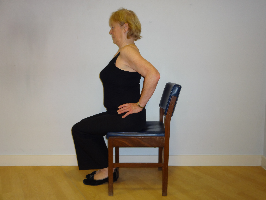
© Oxford University Hospitals NHS Trust 2013
Scapula retraction, sitting, hands on hips
Sit as upright as possible with your hands on your hips.
Squeeze shoulder blades together to take elbows back.
Hold for 5 seconds. Relax. Repeat.
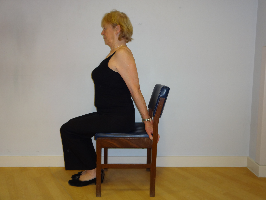
© Oxford University Hospitals NHS Trust 2013
Scapula retraction, sitting, with shoulder extension
Sit towards the edge of a chair with your arms straight by your sides.
Gently turn your hand outwards and reach backwards to place your hands on the chair.
Squeeze shoulder blades together and press your fingers into the chair.
Hold for 5 seconds. Relax. Repeat.
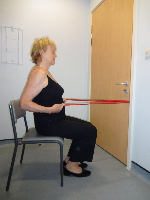
© Oxford University Hospitals NHS Trust 2013
Scapula retraction, sitting, against resistance
Sit on a chair in front of two pieces of theraband tied onto a rail / door handle.
Grasp a theraband in each hand. Bend your elbows and squeeze your shoulder blades together to take your arms back as far as possible.
Hold for 5 seconds. Relax. Repeat.
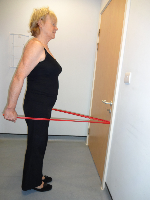
© Oxford University Hospitals NHS Trust 2013
Scapula retraction, standing, against resistance
Stand with your arms by your sides in front of theraband tied to a rail / door handle.
Reach forward to grasp a theraband in each hand. Keeping your elbows straight, squeeze your shoulder blades together and take your arms back as far as possible.
Hold for 5 seconds. Relax. Repeat.
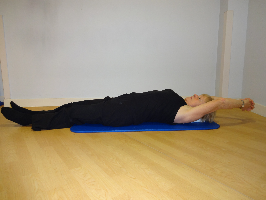
© Oxford University Hospitals NHS Trust 2013
Shoulder elevation, lying
Lie on your back with a pillow or folded towel for your head. Link your hands together OR grasp a towel or pole between your hands.
Straighten your elbows and take your arms over your head as far as possible.
Hold for 5 seconds. Relax. Repeat.
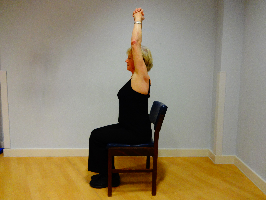
© Oxford University Hospitals NHS Trust 2013
Shoulder elevation, sitting
Sit as upright as possible, link hands together OR grasp towel or pole in both hands.
Straighten your elbows and take your arms over your head as far as possible.
Hold for 5 seconds. Relax. Repeat.
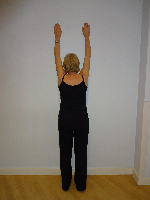
© Oxford University Hospitals NHS Trust 2013
Shoulder elevation, walking hands up wall
Stand facing a wall with your arms by your sides and hands on wall at waist height.
Walk fingers up wall in a straight line as far as possible. Maintain fingertip contact throughout.
Pause, relax and slide fingertips down.
To progress, lift hands off wall when they reach maximal height.
Hold for 5 seconds. Relax. Repeat.
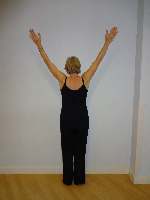
© Oxford University Hospitals NHS Trust 2013
Shoulder elevation, walking hands up and out on wall
Stand facing wall arms by sides and hands on wall at waist height.
Walk fingers up wall and moving hands away from each other as far as possible
Pause, relax and slide finger-tips down.
To progress, lift hands off wall when they reach maximal height.
Hold for 5 seconds. Relax. Repeat.
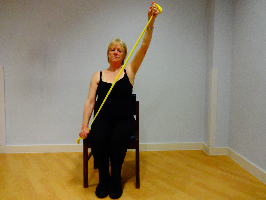
© Oxford University Hospitals NHS Trust 2013
Shoulder flexion and abduction against resistance
Sitting with theraband grasped between hands.
Keep one arm bent and in your lap. Straighten your other arm and lift it up and out to the side as much as possible.
Pause, hold, relax and return to start.
Hold for 5 seconds. Relax. Repeat. Repeat on the other side.
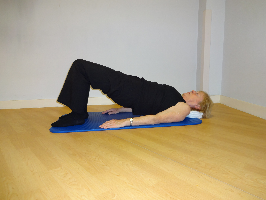
© Oxford University Hospitals NHS Trust 2013
Trunk extension, bridging
Lie on your back with knees bent and feet on the surface.
Tighten your lower stomach muscles without moving your back (pull your tummy button towards the small of your back). Keep breathing gently.
Squeeze your buttocks together and lift your hips as high as possible, lifting one vertebra at a time. Hold, then gently lower your hips to the surface, one vertebra at a time.
Hold for 5 seconds. Relax. Repeat.
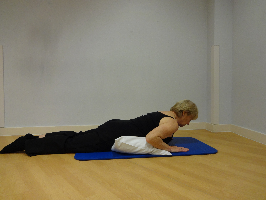
© Oxford University Hospitals NHS Trust 2013
Trunk extension, front lying, upper limbs to assist
Lie on your front over a pillow.
Bend your elbows and place your hands by your shoulders.
Raise your head and trunk to bring your back level with your hips, using your arms to assist as needed.
To progress this exercise, try to reduce the use of your arms and increase the use of your back muscles in lifting your trunk.
Hold for 5 seconds. Relax. Repeat.
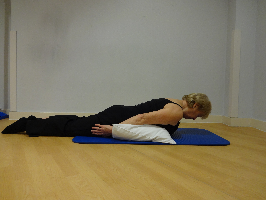
© Oxford University Hospitals NHS Trust 2013
Trunk extension, front lying, arms by sides
Lie on your front over pillow (if needed), arms relaxed by sides.
Lift your trunk off the surface to bring your back level with or higher than your hips.
Hold for 5 seconds. Relax. Repeat.
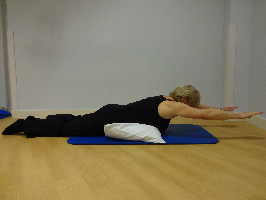
© Oxford University Hospitals NHS Trust 2013
Trunk extension, front lying, arms overhead
Lie on your front over a pillow (if needed) with your arms overhead.
a) Raise 1 arm and your trunk off the surface and hold for 5 seconds. Relax.
b) Raise your other arm and trunk off the surface and hold for 5 seconds. Relax.
Repeat both steps (a) and (b)
To progress, raise your trunk and both arms simultaneously.
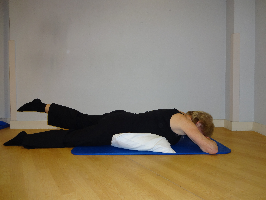
© Oxford University Hospitals NHS Trust 2013
Trunk extension, front lying, alternate leg raises
Lie on your front over a pillow (if needed). Pull your lower tummy muscles in (belly button towards spine).
a) Lift one leg off the surface, keeping your knee straight, and hold for 5 seconds. Relax.
b) Lift your other leg off the surface, keeping your knee straight, and hold for 5 seconds. Relax.
Repeat both steps (a) and (b)
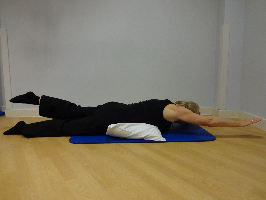
© Oxford University Hospitals NHS Trust 2013
Trunk extension, front lying, alternate arm and leg raises
Lie on your front over a pillow (if needed) and arms overhead. Pull your lower tummy muscles in (belly button towards spine).
a) Raise one arm and the opposite leg and hold for 5 seconds. Relax.
b) Repeat with other arm and leg.
Repeat both steps (a) and (b)
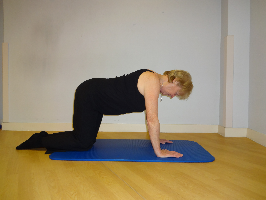
© Oxford University Hospitals NHS Trust 2013
Four point kneeling, recruiting abdominals
Start on your hands and knees with arms straight, back level, head midline and eyes looking down (table-top position). Keep breathing gently throughout.
Tighten your lower stomach muscles without moving your back (pull your belly button away from the floor).
Hold for 5 seconds. Relax. Repeat.
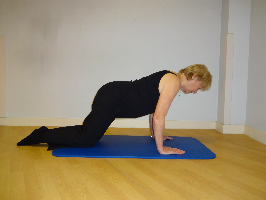
© Oxford University Hospitals NHS Trust 2013
Four point kneeling weight shifting
Start on your hands and knees with arms straight, back level, head midline and eyes looking down (table-top position). Tighten your lower stomach muscles (pull your belly button away from the floor).
Slowly shift your weight forwards over your hands, then backwards over your heels.
Hold for 5 seconds. Relax. Repeat.
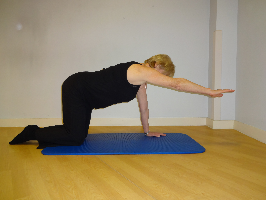
© Oxford University Hospitals NHS Trust 2013
Four point kneeling weight shifting
Start on your hands and knees with arms straight, back level, head midline and eyes looking down (table-top position). Tighten your lower stomach muscles (pull your belly button away from the floor).
Keep your back level. Lift one arm to stretch forwards, keeping your elbow straight.
Hold for 5 seconds, then lower your arm and repeat on the other side. Repeat.
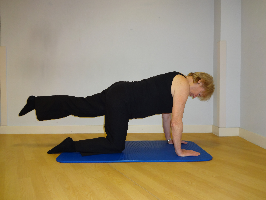
© Oxford University Hospitals NHS Trust 2013
Four point kneeling with leg lifts
Start on your hands and knees with arms straight, back level, head midline and eyes looking down (table-top position). Tighten your lower stomach muscles (pull your belly button away from the floor).
Keep your back level. Lift one leg up and back behind you, straightening your knee.
Hold for 5 seconds, then lower your leg and repeat on the other side. Repeat.
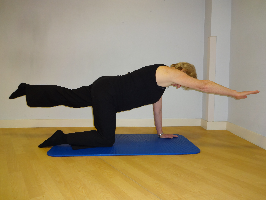
© Oxford University Hospitals NHS Trust 2013
Four point kneeling with opposite arm and leg lifts
Start on your hands and knees with arms straight, back level, head midline and eyes looking down (table-top position). Tighten your lower stomach muscles (pull your belly button away from the floor).
Lift one arm and the opposite leg to a horizontal position.
Hold for 5 seconds. Relax. Repeat with the other arm and leg. Repeat.
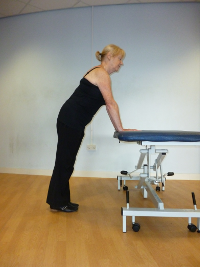
© Oxford University Hospitals NHS Trust 2013
Modified four point kneel abdominal recruitment in standing
Position: Stand with your feet shoulder width apart and hand supported on the kitchen counter or dining table. Keep your arms straight, back straight, head midline and eyes looking straight ahead. Keep breathing gently throughout.
Tighten your lower stomach muscles without moving your back (pull your belly button towards your spine).
Hold for 5 seconds. Relax.
Number of repetitions............
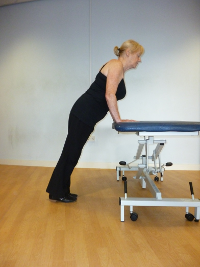
© Oxford University Hospitals NHS Trust 2013
Modified Four point kneel weight shift in standing
Position: Stand with your feet shoulder width apart and hand supported on the kitchen counter or dining table. Keep your arms straight, back straight, head midline and eyes looking straight ahead. Tighten your lower stomach muscles (pull your belly button towards your spine). Keep breathing gently throughout.
Slowly shift your weight forwards over your hands, then backwards over your heels.
Hold for 5 seconds. Relax.
Number of repetitions............
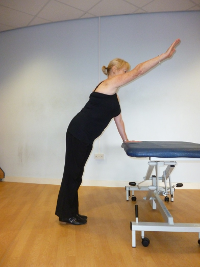
© Oxford University Hospitals NHS Trust 2013
Modified Four point kneel arm lift in standing
Position: Stand with your feet shoulder width apart and hand supported on the kitchen counter or dining table. Keep your arms straight, back straight, head midline and eyes looking straight ahead. Tighten your lower stomach muscles (pull your belly button towards your spine). Keep breathing gently throughout.
Lift one arm to stretch forwards, keeping your elbow straight.
Hold for 5 seconds, then lower your arm and repeat on the other side.
Number of repetitions............
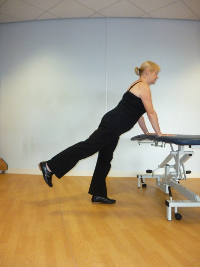
© Oxford University Hospitals NHS Trust 2013
Modified Four point kneel with leg lift in standing
Position: Start on your hands and knees with arms straight, back level, head midline and eyes looking down (table-top position). Tighten your lower stomach muscles (pull your belly button towards your spine).
Keep your back level. Lift one leg up and back behind you, straightening your knee.
Hold for 5 seconds, then lower your leg and repeat on the other side.
Number of repetitions............
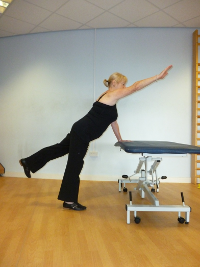
© Oxford University Hospitals NHS Trust 2013
Modified Four point kneel opposite arm and leg in standing
Position: Stand with your feet shoulder width apart and hand supported on the kitchen counter or dining table. Keep your arms straight, back straight, head midline and eyes looking straight ahead. Tighten your lower stomach muscles (pull your belly button towards your spine). Keep breathing gently throughout.
Lift one arm and the opposite leg as seen in the picture.
Hold for 5 seconds. Relax. Repeat with the other arm and leg.
Number of repetitions............
.png)
© Oxford University Hospitals NHS Trust 2013
.png)
© Oxford University Hospitals NHS Trust 2013
Sit to Stand
Sit in a chair with your feet hip width apart.
Stand up fully, then sit down again. Use your arms if needed.
Repeat.
.png)
© Oxford University Hospitals NHS Trust 2013
.png)
© Oxford University Hospitals NHS Trust 2013
Step ups
Step on and off a step. This could be the bottom step of your stairs.
Use a handrail or supportive worktop nearby for balance if needed.
Repeat.
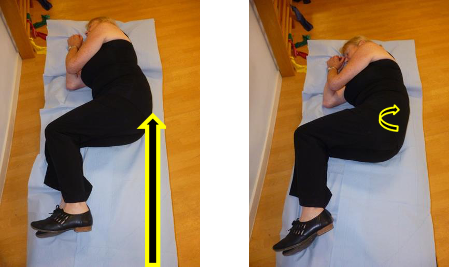
© Oxford University Hospitals NHS Trust 2013
Pelvic Tilt in side-lying
Position: Lie on your side with hip and knees bent at 90 degrees.
Tighten the muscles in your stomach and buttocks together, pulling your lower back further back (pull your tummy button towards the small of your back). Keep breathing gently.
Hold for 5 seconds. Relax.
Number of repetitions............
Straight Arrow: Neutral Spine.
Curly Arrow: Flat Spine.
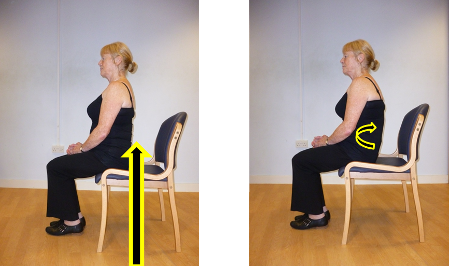
© Oxford University Hospitals NHS Trust 2013
Pelvic Tilt in sitting
Position: Sit on a chair with thighs supported and feet on the floor.
Tighten the muscles in your stomach and buttocks together, pushing your lower back into the back of the chair (pull your tummy button towards the small of your back). Keep your back flat against the back of the chair. Use a roll of towel for back support if required. Keep breathing gently.
Hold for 5 seconds. Relax.
Number of repetitions............
Straight Arrow: Neutral Spine.
Curly Arrow: Flat Spine.
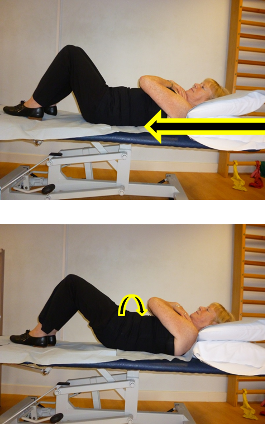
© Oxford University Hospitals NHS Trust 2013
Pelvic Tilt in supine
Position: Lie on your back with knees bent and feet on the surface.
Tighten the muscles in your stomach and buttocks together, pushing your lower back into the bed (pull your tummy button towards the small of your back). Keep your back flat against the bed. Keep breathing gently.
Hold for 5 seconds. Relax.
Straight Arrow (above): Neutral Spine.
Curly Arrow: Flat Spine.
Number of repetitions............
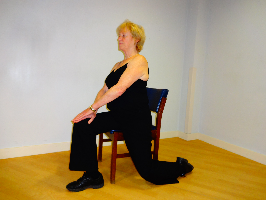
© Oxford University Hospitals NHS Trust 2013
Hip Stretch - Seated
Sit on the side of a chair without arms.
Drop one knee down towards the floor and let your foot slide back and hip straighten. Tighten your bottom muscles.
You should feel a stretch in the front of your hip and thigh.
Hold for 30 seconds.b
Repeat on each leg 3 times.
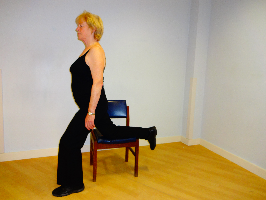
© Oxford University Hospitals NHS Trust 2013
Hip Stretch - Seated
Stand near a wall or worktop with a chair or stool nearby.
Place one hand onto the wall or worktop for support. Bend one knee and support your lower leg on a stool or chair. Take a small step forward with the other leg.
Tighten your bottom muscles and straighten your hip. Feel a stretch at the front of your hip of the leg supported by the stool.
Hold for 30 seconds.
Repeat on each leg 3 times.
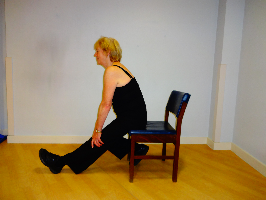
© Oxford University Hospitals NHS Trust 2013
Hamstring Stretch
Sit on a firm chair. Stretch one leg out in front of you.
Lean forward from your hips keeping your back straight. You should feel a stretch behind your knee and thigh.
Hold for 30 seconds.
Repeat on each leg 3 times.
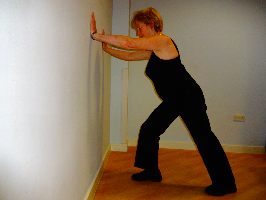
© Oxford University Hospitals NHS Trust 2013
Calf Stretch - Knee Straight
Place your hands on a wall, worktop or back of a sturdy chair for support.
Step one leg back behind you keeping your knee straight and your foot flat on the floor. Lunge forwar over your front leg. Feel a stretch in the calf of the straight leg behind.
Hold for 30 seconds.
Repeat on each leg 3 times.
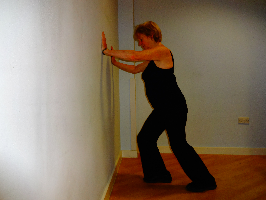
© Oxford University Hospitals NHS Trust 2013
Calf Stretch - Knee Bent
Place your hands on a wall, worktop or back of a sturdy chair for support.
Step one leg back behind you. Bend both knees and let the weight of your body stretch the calf of your back leg without lifting the heel off the floor.
Hold for 30 seconds.
Repeat on each leg 3 times.
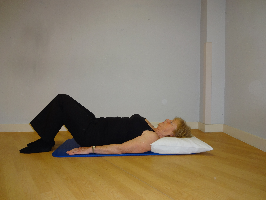
© Oxford University Hospitals NHS Trust 2013
Lying on back, pillow for head
Lie on your back with your head on __ pillow(s) and your hips and knees bent and feet on the surface. (Use the minimal number of pillows possible). Arms relaxed by sides. Hold for 5 minutes (progress to 7 minutes). Relaxed, low effort abdominal breathing pattern.
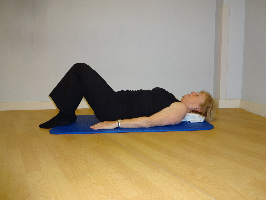
© Oxford University Hospitals NHS Trust 2013
Lying on back, folded towel for head
Lie on your back with hips and knees bent, chin tucked as able and folded towel for head. Arms relaxed by sides.
Hold for 5 minutes (progress to 7 minutes).
Relaxed, low effort abdominal breathing pattern.
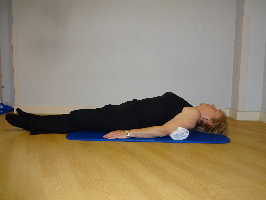
© Oxford University Hospitals NHS Trust 2013
Lying on back, rolled towel under upper back
Lie on your back with hips and knees bent, chin tucked as able with a small rolled towel under the most prominent part of your upper back (5th to 7th thoracic vertebrae, perpendicular to spine). Arms relaxed by sides.
Hold for 5 minutes (progress to 7 minutes).
Relaxed, low effort abdominal breathing pattern.
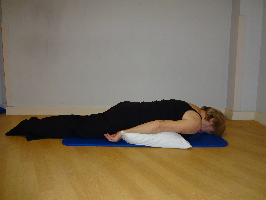
© Oxford University Hospitals NHS Trust 2013
Front lying over pillows
Lie on your front with one or more pillows under your tummy. Keep arms relaxed by sides. (Minimal number of pillows required).
Hold for 5 minutes (progress to 7 minutes).
Relaxed, low effort abdominal breathing pattern.
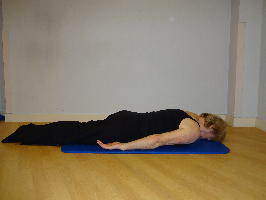
© Oxford University Hospitals NHS Trust 2013
Front lying
Lie on your front, arms relaxed by sides. (No pillow)
Hold for 5 minutes (progress to 7 minutes).
Relaxed, low effort abdominal breathing pattern.
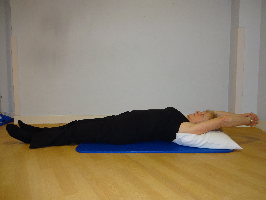
© Oxford University Hospitals NHS Trust 2013
Lying on back, arms overhead, with pillow
Lie on your back with one pillow for your head and legs out straight. Link your hands together (or grip a towel / stick if more comfortable).
Breathe in and keeping your elbows straight, stretch your hands up and over your head as far as you can. Breathe out and relax in this position. Hold for 1 minute.
Repeat 3 times.
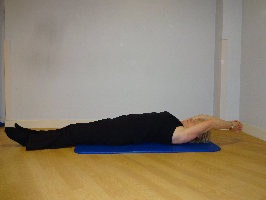
© Oxford University Hospitals NHS Trust 2013
Lying on back, arms overhead, no pillow
Lie on your back with no support or one folded towel for your head and legs out straight. Link your hands together (or grip a towel / stick if more comfortable).
Breathe in and keeping your elbows straight, stretch your hands up and over your head as far as you can. Breathe out and relax in this position. Hold for 1 minute.
Repeat 3 times.

© Oxford University Hospitals NHS Trust 2013
Shoulder stretch arms overhead (in sitting)
Position: Sit in a chair with a rolled towel behind your low back.
Raise your hands over your head together (or grip a towel // stick if more comfortable). Breathe in and keeping your elbows straight, stretch your hands up and over your head as far as you can.
Don’t hold your breathe.
Hold this position for 1 minute.
Repeat 3 times.
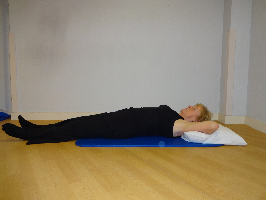
© Oxford University Hospitals NHS Trust 2013
Hands behind head with pillow
Lie on your back with a pillow for your head. Place your hands behind your head.
Allow your elbows to drop out to the side. Relax in this position. Hold 1 minute.
Repeat 3 times.
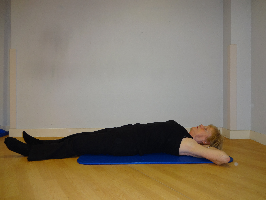
© Oxford University Hospitals NHS Trust 2013
Hands behind head without pillow
Lie on your back with no pillow or with a folded towel for your head. Place your hands behind your head.
Allow your elbows to drop out to the side. Relax in this position. Hold 1 minute.
Repeat 3 times.
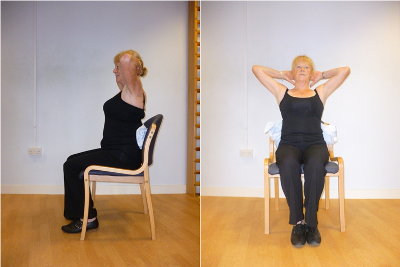
© Oxford University Hospitals NHS Trust 2013
Shoulder stretch arms behind head (in sitting)
Position: Sit in a chair with a towel roll behind your low back.
Place your hands behind your head. Move your elbows back.
Keep your back as straight and upright as you can.
Hold 1 minute.
Repeat 3 times.
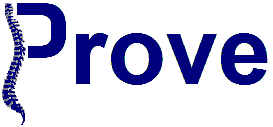






.png)
.png)

.png)

.png)

.png)

.png)

.png)
.png)
.png)
.png)






























.png)
.png)
.png)
.png)




















